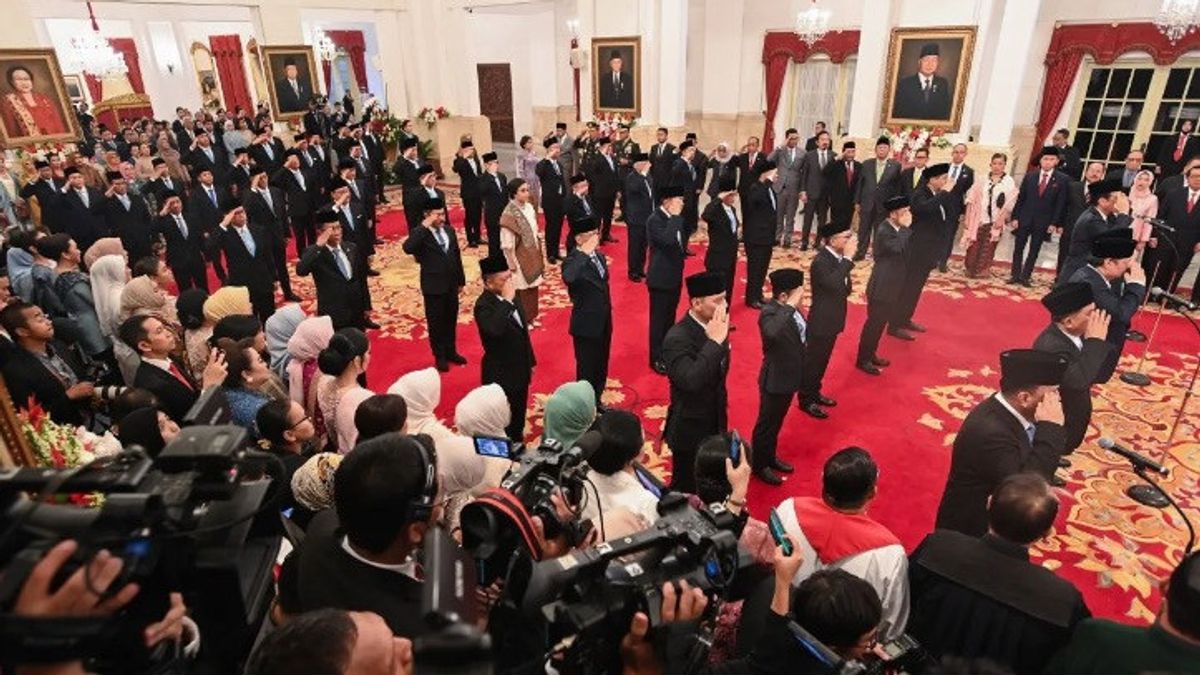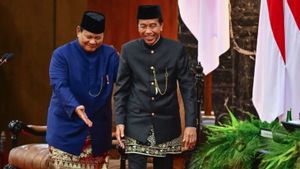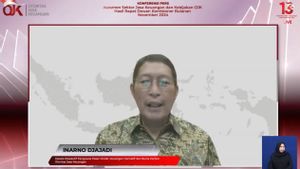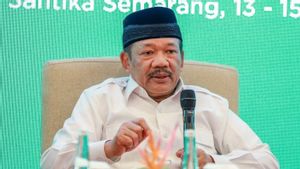JAKARTA President Prabowo Subianto has appointed ministers and deputy ministers, on Monday (21/10/2024). Prabowo's leadership cabinet is considered the most fat from the New Order to Reform.
A series of inaugurations of 48 state ministers and 56 deputy ministers have been held at the State Palace the day after Prabowo was officially appointed as the eighth President of the Republic of Indonesia, replacing Joko Widodo. So that in total there are 106 ranks of ministers and deputy ministers in the Red and White Cabinet.
In addition to the ranks of ministers, President Prabowo also appointed ministerial-level officials. They are the Attorney General, the Head and Deputy Chief of Presidential Staff, the Head of the State Intelligence Agency (BIN), the Head of the Presidential Communication Office, and the Chairman of the National Economic Council.
The Red and White Cabinet, that's the cabinet name led by President Prabowo. Since before the inauguration earlier this week, rumors about Prabowo's cabinet have become the talk of various circles.
Prabowo is predicted to accommodate the names that have contributed to the 2024 Presidential Election (Pilpres). Moreover, the Prabowo-Gibran pair is promoted by the Advanced Indonesia Coalition (KIM) which contains the Gerindra Party, Golkar Party, PAN, and the Democratic Party, as well as non-parlementary parties.
The revision of Law Number 39 of 2008 concerning the Ministry of State which was passed on September 19, confirms the suspicion that Prabowo's cabinet will be fat. Previously, Article 15 of Law 39/2008 only allowed the president to have a maximum of 34 ministries for bureaucratic reform.
That means, the number of ministries is not possible to exceed that number and is expected to decrease. However, after the inauguration, the analysis made by a number of experts that Prabowo would make the "reply cabinet" true.
Prabowo-Gibran carried out a number of reshuffles, as can be seen from the number of coordinating ministries in the Red and White Cabinet. Prabowo's Cabinet has 14 new ministries out of a total of 48 ministries. This number is more than the Jokowi era which only has 34 ministries.
This also caused the number of ministers in the Red and White Cabinet to swell. Whereas previously, in the era of President Soeharto, who served for 32 years, the highest number of ministers occurred in the 1988-1993 period.
The Construction Cabinet V at that time had a total of 44 ministers. Meanwhile, in the era of Abdurrahman Wahid, Megawati Soekarnoputri, and Susilo Bambang Yudhoyono each had 36, 33, and 34 ministers. Jokowi, who led in the last 10 years, was assisted by 34 ministers in each of his periods, the Working Cabinet and the Advanced Indonesia Cabinet.
Head of the Presidential Communication Office Hasan Nasbi rejected the accusation that Prabowo's ministerial composition was a fat cabinet. According to him, the ministry's organization is getting slimmer now because it is separated.
He gave an example of the Ministry of Public Works and Public Housing (PUPR) which was divided into the Ministry of Public Works and the Ministry of Public Housing made each focus more on their respective duties.
Likewise, the Ministry of Forestry and Environment, which is now being appointed as the Ministry of Environment/Environmental Control Agency and the Ministry of Forestry.
"So you can imagine that the organization that was fat yesterday has now become leaner," said Hasan Nasbi.
However, University of Indonesia (UI) public policy observer Lina Miftahhul Jannah questioned the basis for study and performance evaluation that made many ministries broken down.
SEE ALSO:
When creating a new institution, there should be an in-depth study. If it's a coordination problem, obviously this is a setback (reformation of the bureaucracy). What can be used as one is even broken down," said Lina.
He added that the fatness of the Red and White Cabinet is against the spirit of bureaucratic reform. Instead of getting more efficient, the fat cabinet can actually extend and complicate the bureaucracy, and trigger overlapping authority.
"It's a picture that the goal is only for political purposes," Lina said while calling the Red and White Cabinet a "retired cabinet".
Prior to the announcement of the minister and deputy minister, Prabowo Subianto planned to form a zaken (zakenkabinet) cabinet, namely where the position of cabinet members is filled by experts in their respective fields. The same thing was also stated by the Secretary General of the Gerindra Party, Ahmad Muzani, who explained that this cabinet was filled with people who had competence in their fields.
German sociologist Max Total emphasized the importance of meritocracy in government structures, where people who are chosen to hold public positions are based on their professional abilities, expertise, and track record. Meritocracy ensures that important decisions are taken by competent and experienced individuals.
Citing the Center of Economic and Law Studies (CELIOS) page, the public actually hopes that this new government will be formed by professional individuals who are able to bring positive and effective changes in state governance.
"However, the disappointment began to be felt among the public because some of the names that appeared were not well known for their professional skills, but rather for post-election political services," wrote CelIOS.
As is known, of the 106 names appointed by the minister and deputy minister, 45 of them are affiliated with political parties. Gerindra, a political party chaired by Prabowo, sent 15 of its cadres in the Red and White Cabinet. Followed by the Golkar Party which contributed 11 ministerial positions as well as deputy ministers, PAN and the Democratic Party each received four.
This further strengthens the allegation that the filling of cabinet ranks is based on the interests of political retaliation that prioritizes central actors in the Prabowo-Gibran National Campaign Team (TKN).
CelIOS researcher Galau D. Muhammad said the division of positions not only caused moral disappointment, but also had the potential to create significant budget waste.
"The more deputy ministers appointed it means it will increase state spending, including salaries for supporting staff, procurement of official cars, office facilities, to payment of pension salaries for the minister and deputy minister," he said.
The English, Chinese, Japanese, Arabic, and French versions are automatically generated by the AI. So there may still be inaccuracies in translating, please always see Indonesian as our main language. (system supported by DigitalSiber.id)














